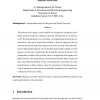Free Online Productivity Tools
i2Speak
i2Symbol
i2OCR
iTex2Img
iWeb2Print
iWeb2Shot
i2Type
iPdf2Split
iPdf2Merge
i2Bopomofo
i2Arabic
i2Style
i2Image
i2PDF
iLatex2Rtf
Sci2ools
IJPRAI
1998
1998
Obtaining The Correspondence between Bayesian and Neural Networks
We present in this paper a novel method for eliciting the conditional probability matrices needed for a Bayesian network with the help of a neural network. We demonstrate how we can obtain a correspondence between the two networks by deriving a closed-form solution so that the outputs of the two networks are similar in the least square error sense, not only when determining the discriminant function, but for the full range of their outputs. For this purpose we take into consideration the probability density functions of the independent variables of the problem when we compute the least square error approximation. Our methodology is demonstrated with the help of some real data concerning the problem of risk of desertification assessment for some burned forests in Attica, Greece where the parameters of the Bayesian network constructed for this task are successfully estimated given a neural network trained with a set of data.
| Added | 22 Dec 2010 |
| Updated | 22 Dec 2010 |
| Type | Journal |
| Year | 1998 |
| Where | IJPRAI |
| Authors | Athena Stassopoulou, Maria Petrou |
Comments (0)

